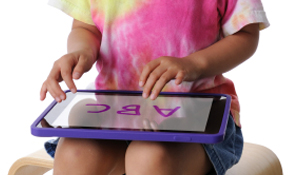At 74, artist David Hockney has become a champion for the iPad, creating his larger-than-life exhibition with the device's touch-screen paint tools.
But how do we feel about getting those at the other end of the age spectrum - children under 12 - using technology?
MediaLab asked:
Should we be actively encouraging children to get stuck into technology?
The question was opened up to both parents with children under the age of 12, and those with children older than 12 - to reflect on whether or not young people should, or should not be encouraged to engage with technology.
Interacting with technology is, for many of us, simply part of the day-to-day. So we asked technology savvy parents taking part in MediaLab to tell us (if they think children should be encouraged to use technology) which items they thought best to put into the hands of a child.

Should parents encourage young children to use technology? Which item would be best for children to get to grips with? Take part in the discussion using Disqus below!
Children SHOULD use technology
Participants from across the parent groups thought under-12s should be encouraged to use technology for the following reasons:
- Children should learn how to use technology now, to equip them for the modern world
- The UK's future success lies in technological innovation. Today's children will be responsible
- Children learn quickly, and can be confident about technology in a way that many adults aren't
Click the boxes below to see why some parents think children should be encouraged to engage with technology
Views from parents with children aged 12 and younger
 “Children should be encouraged to use computers and to understand how they work (general principles such as abstraction, data encoding, simple programming logic, how internet and TCP/IP works, etc.), rather than just using computers as consumer devices that operate as closed black-boxes”Anon
“Children should be encouraged to use computers and to understand how they work (general principles such as abstraction, data encoding, simple programming logic, how internet and TCP/IP works, etc.), rather than just using computers as consumer devices that operate as closed black-boxes”Anon
“The understanding and development of technology is going to be the only force left in the British economy if we can stay ahead of China, and compete with South Korea and India. Children must be exposed to technology so they can compete as adults” Peter, Fife
“Children should have safe access to and learn to use technology which will be relevant to their education and give them access to the arts, etc...” Anna, Hertfordshire
“Technology is the way ahead. Children should be encouraged to embrace new innovations, but in a carefully supervised way. They should not be staring at screens for hours a day, but limited access can only be good for their future and the country’s future” Margaret, Cambridge
“I think the sooner people can engage with new technologies, the better-equipped they are for the future. I believe using computers at an early age can aid and improve both literacy and numeracy skills. I am not keen, however, on children playing games on consoles/computers etc. that have no educational benefits, or include even mild violence” Lindsay, Scotland
“It is better to embrace technology and use it to your advantage rather than seeing it as an enemy or negatively. I encourage my children to use technology to complete homework tasks and to visit maths and English learning sites regularly. It is great to have and use technology as a tool for learning and then let them go onto other websites as a treat afterwards” Rachel C, Ashton-under-Lyne
“While for the youngest children (for example, under 5's) access to such technology should be limited, and 11 year-olds should not have smartphones (too much risk of being mugged for starters), by 11 they need to be learning to use technology as it will be a common part of their lives as adults” Vanessa, Hampshire
Responses from parents with children older than 12
 “They are at a good age to absorb all the knowledge necessary to make the most of today's technology” Dee, Devon
“They are at a good age to absorb all the knowledge necessary to make the most of today's technology” Dee, Devon
“I think that it is essential to learn young. My sons had BBC computers at school 25 years ago and are confident in a way that I learning at 40 am not. But they did not have technology at home, so I would be happy for under 12s not to use technology at home but to enjoy play, crafts and books” Anon
“Our young children should be encouraged to use it competently and confidently while they have no hang ups about it. Far too many adults are nervous about technology and shy away from it at all costs” Anon
“Technology is part of Western culture. Children should be brought up using it, but like everything else, need to learn that there is a time and a place for everything. Technology should enhance real life, not replace it” Anon
“Children should be encouraged to use it at an early age so that they are comfortable with it. I struggle with it from time to time and would be lost without my granddaughter’s help” Carol T, Teignmouth
“Technology is part of human life. A computer or tablet today is the same as a slate was in the XIX century” FZ, Retford
“My grandchild who is 4 uses a computer as a learning tool, both at Pre-school and at home, which I think is a good thing. He uses a Leap Pad at home which he uses very well as a learning tool. He also listens to children’s music on a MP3 player on long journeys in the car. Obviously use of these things need to be monitored by an adult” Denise E, Scarborough
Children SHOULD NOT use technology
Then those parents who took the opposite view gave their reasons as to why they thought children should not be actively encouraged to use technology:
- Children should develop their reading, writing and problem-solving skills without computers
- Children engage with technology at the expense of real relationships, and building social skills
- Children should be physically active, not sedentary in front of a screen
Click the boxes below to see why some parents think children shouldn't be encouraged to engage in technology
Views from parents with children aged 12 and younger
“Too much time with technology means that they cannot think for themselves and expect a lot to be done for them. One of the reasons for childhood obesity” Joel, Essex

“Children will have their whole lifetime to play with these things, whilst they would benefit from enjoying childish things. At my son’s school, he endures constant teasing/bullying because his peers cannot believe that he has no iPod, or games console of any sort. Instead he is termed a 'Nerd' because of his better reading abilities and wide knowledge gained from that reading” Gavin, Aberdeen
“There are simpler things for children to do” Anon
“Technology is a good thing, but it is making things too easy for our children. They should be using their brains and books, not calculators and Google!” Kas, London
“I feel they should be able to enjoy being a child and playing outside, or doing other creative things. I also worry that young children with things like mobile phones and iPods, etc., are at risk of being mugged or beaten up by other children who want to steal them” Claire R, Staffordshire
“Children under the age of 12 should be acting like children, playing games with their friends and playing outside – not going online to chat to friends or texting them from inside. My daughter spends a lot of time playing her 3DS and Wii console alone, so I try to encourage her to go outside, but all her friends are doing the same thing – sitting in front of a computer game rather than interact with other kids. Under-12s should not be recluses; they should be enjoying their childhood” Ciara D, Armagh
“I think children should be children for longer, new technology just demands they grow up quicker” Anon
Responses from parents with children older than 12
 “They are susceptible to websites which are not appropriate” SMB, Angus
“They are susceptible to websites which are not appropriate” SMB, Angus
“It prevents them getting fresh air, sunshine and exercise which are all important in developing a healthy body” Ken D, Fife
“They should be living their lives to make personal social contact, and not contact by technology. Learning basic computer use is OK , but why does a 8 year old need a mobile phone?” Stewart, Higham Ferrers
“Obsession. Children should not be allowed mobile phones before the age of 16. Too much pressure on parents to provide the most expensive technology to keep up with peer groups, and phones in particular create disruption in school. Most young people today seem to have a phone glued to their hands and are obsessed with 'social' networking sites” MB, Staffordshire
“As I a teacher I have observed that children who make frequent use of technology are rarely as good at reading, writing and arithmetic as those who don't. They also have impoverished imaginations and shorter attention spans”Didact, Rodborough
“I work in primary education and many children can use these gadgets better than us at a very young age but lack other basic skills in life: being able to use a knife and fork; being able to write their own name; and for some, even being able to go to the toilet unaided! BUT give them a controller and they are fine! We need to remember that they are children and very young children at that ... they will have a lifetime of these gadgets and they need to be able to have other life skills first. For older children I think it has completely altered their art of conversation. My daughter 15 year old daughter has a 'boyfriend' that she hasn't even really spoken to face to face, but they communicate very easily over text/ Facebook etc.” Anon
“Because they can bring things up using the internet, their learning suffers. For example, none of my children, aged 14, 17, and 19, can tell the time on a standard clock. They can only understand a digital clock, and even then they think 17.00 means 7 o'clock. And they have no idea of lengths of time” Anon
Which technologies are best for the under-12s?
We then asked all the parents taking part in Labs who thought children under 12 shouldbe encouraged to use technologies, to select one mainstream item they thought best for a child to learn how to use. Participants across both parent groups agreed on the following top 3:
1. A laptop or computer
“It is multi-functional as opposed to a Tablet or mobile phone. It generally has a larger screen, encourages the child to use a keyboard, thus improving typing skills, use of a mouse etc. It usually has all of the features of a Tablet but can also be helpful for creating documents for school work etc.” Matthew O’B, Bristol

“Laptops and computers are a tool of everyday life. They teach a child advanced IT skills, preparing them for the outside world. Most jobs require the applicant to have basic IT skills and to know their way around a computer” Anon
“As long as it's monitored, computer use is good for stimulating children and getting them interested in various subjects they can discover more about online” Terry, London
“It is a never ending source of knowledge” Bill, Liverpool
“It is versatile and they can learn games, how to access the internet and there are no safety issues such as possibility of mobile phones and cancer” Lyn, Leigh
“It allows children to write and get help with grammar, to do calculations, to read about the world, and to keep in touch with friends and relatives” Anon
2. A Tablet
 “In our house, the iPad is ours (the parents’) not the child's, so we can very easily restrict how much time our child spends on the device – he knows it's a special treat. The apps can be very educational too. Due to our child's age, we control the content anyway, whatever device used” Anon
“In our house, the iPad is ours (the parents’) not the child's, so we can very easily restrict how much time our child spends on the device – he knows it's a special treat. The apps can be very educational too. Due to our child's age, we control the content anyway, whatever device used” Anon
“It is simple to use with intuitive features, and combines fun apps with access to skills and knowledge development” Dave, Liverpool
“The technology has advanced to the stage where it is very intuitive, and does not exclude people who have a different way of approaching knowledge and accessing information to the standard approach which formal education and the post-industrial society prefer. There is plenty of software which helps people learn in an interesting and engaging way and, if guided well, can enable people to engage with different perspectives on the same issue easily” Anon
“Tablets are the most future-proof” Bob, UK”
“They can draw and write and phone and play music and photograph and calculate and satnav on it – i.e. the iPad offers just about all the facilities needed by all the other gadgets individually” Jill, Richmond
“Very simple to use with touch-based control” Ray G, Lancashire
“It is small and easily portable. My 1 year old granddaughter can use one” Gill, Stourbridge
3. Children's tablets, e.g. V-Tech, Leap Pad
 “They are especially designed for children to use. There is a vast amount of games, apps and the like out there for kids where they playfully learn a lot of new skills like writing, reading and math” Sandra M, Bedfordshire
“They are especially designed for children to use. There is a vast amount of games, apps and the like out there for kids where they playfully learn a lot of new skills like writing, reading and math” Sandra M, Bedfordshire
“For younger children this is most suitable tool to start on as provided them stimulation and activities fitting their ages and intellectual learning abilities generally – unless child is exceptionally talented in this area” A Bush, Coventry
“It's very forgiving in its functionality and is specifically designed to help children learn other skills such as reading, writing and mathematics”
“At the earliest stages, this is an ideal platform” Russem, Lancashire
“It is quite basic and is a good stepping stone to start with. My four year old grandson has one and enjoys it” Carol T, Teignmouth
“Has appropriate software for age group but does allow usage skills to develop” Anon
“COST. Mobile phones , Tablets etc. are expensive items, and therefore a cost effective child's tablet would be my preference. Having a very young relative (age 3) who can use an iPhone/ iPad, we don't like to leave them unattended in doing so, which I think can inhibit their use of/ investigation of this technology”Anon
“There is no web connection, therefore no threat to the individual child from pornography, etc.” Margaret, Wigan

Should parents encourage young children to use technology? Which item would be best for children to get to grips with? Take part in the discussion using Disqus below!







